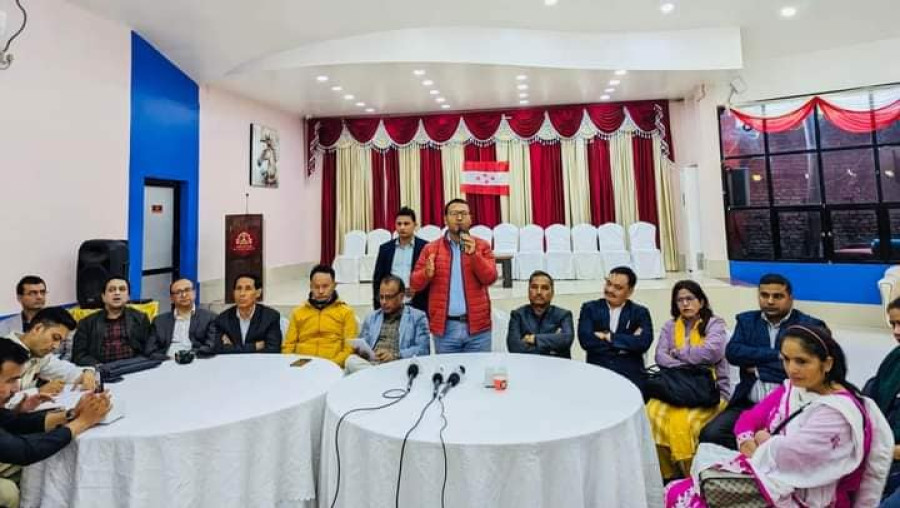Politics
Nepali Congress youth leaders demand ideological overhaul after election losses
Leaders criticise party chief Sher Bahadur Deuba’s work approach, unilateral decision-making.
Anil Giri
On Thursday, some youth leaders of the Nepali Congress held a meeting in Kathmandu to discuss ways to revive the party that suffered badly in last month’s bypolls in Chitwan and Tanahun.
Although the party had not fielded its candidate in Bara, its candidates in the two other constituencies lost to the candidates of the new Rastriya Swatantra Party with huge margins. In Chitwan, however, the party had little hope of defeating the RSP chair Rabi Lamichhane, but it had not expected to lose the Tanahun constituency, which was vacated after Congress leader Ram Chandra Poudel was elected to the post of President.
Senior and mid-rung Congress leaders appear seriously worried about the future of the party particularly with the rise of the RSP.
“We, some youths and like-minded friends sat on Thursday, and plan to sit again on Saturday,” Gururaj Ghimire, a leader of the party and staunch critic of party president Sher Bahadur Deuba said, adding, “we will chart out a strategy and will visit various districts campaigning for the party’s revival.”
He said they plan to start the campaign from Madhesh Province.
“Our organizational base is deeply disturbed and disorganised in Madhesh. We will campaign for party building in eight districts of Madhesh with two mass meetings planned in each district,” said Ghimire.
Senior Congress leader Shashank Koirala is among those who believes the party’s popularity has dwindled significantly and there is a need of serious soul searching to revive the glory of the party.
The results of the by-polls should be reviewed and thoroughly discussed in the party’s central working committee, says Koirala.
With the rise of the RSP, which identifies itself as an alternative to the traditional parties and has been making tall promises about service delivery, corruption control and good governance if it comes to power, many local leaders of the Nepali Congress have been joining the new party.
There is another concern inside Congress regarding the working approach of party president Sher Bahadur Deuba.
“It seems Deuba is not bothered by the party’s poor show in the elections and the threat posed by new parties,” a Congress office bearer said at the meeting of the party office bearers on Thursday.
The two general secretaries, Gagan Thapa and Bishwa Prakash Sharma, have been expressing dissatisfaction at party chair Deuba’s work methods, which they say have become a source of discord inside and outside the party.
Both Thapa and Sharma accuse Deuba of taking decisions unilaterally while appointing office bearers in the party’s sister organisations, nominating members to the National Assembly and selecting ministers.
Thapa and Sharma claim that the recently appointed three ministers from Congress were nominated by Deuba by ignoring the principles of inclusion and geographical representation.
Of the eight ministers representing the Congress, five are from Khas/Arya and three are from Janajati clusters. The party has no minister representing Madhesi, dalit, Tharu, Musilm and backward regions.
Political analyst Geja Sharma Wagle advises the Congress to redefine its ideological, theoretical and organisational approaches and priorities if it seriously wants to transform itself.
Earlier Congress had planned a policy convention in December 2021, but that did not happen due to the Covid pandemic. The leaders are again demanding that the party schedule such a convention in order to redefine and clarify the party’s ideology, policies and principles.
“Now the economic policy that the Nepali Congress adopted since the restoration of democracy in 1990 has come under question. Had it been effective and brought about an economic transformation, we would not see the country in such a mess including the mass exodus of youths and a stagnant economy. That’s why the party should convene a policy convention,” Wagle told the Post.
Meanwhile, leader Koirala talking to journalists in Chitwan on Friday said the rise of the failure of the traditional parties in addressing people’s aspirations was responsible for the rise of the new parties.
“We need to revisit our old policies and make timely changes. Our internal mismanagement was equally responsible for the electoral defeat. Also the way ministers were nominated has added to the dissatisfaction in the party,” said Koirala.




 13.12°C Kathmandu
13.12°C Kathmandu














